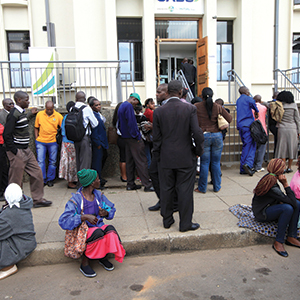Zimbabwe’s Churches met the governor of the Reserve Bank this month to discuss his attempts to avert financial collapse in the country. Since the abandonment of the Zimbabwe dollar due to hyperinflation in 2009, Zimbabwe has been using the US dollar in a multi-currency system including the euro and South African rand.
However, the system proved unsustainable, with the massive transfer of funds abroad proving ruinous for an economy that was already in tatters. John Mangudya, governor of the Reserve Bank of Zimbabwe (RBZ), announced in May that the Government would introduce in October $200 million worth of bond notes pegged to the US dollar. The announcement brought long queues to withdraw cash, and sums had to be limited by the banks.
Zimbabweans fear that the Government is trying to reintroduce the Zimbabwe dollar and convert people’s funds into local currency. Memories of the economic meltdown and empty shelves of 2008 are still raw. “In many ways this brings memories of the hyperinflation era when most people lost their assets, savings, livelihoods and pensions,” the Zimbabwe Heads of Christian Denominations (ZHOCD) said after meeting Mr Mangudya.
But the Churches – ZHOCD comprises the Zimbabwe Council of Churches, Zimbabwe Catholic Bishops’ Conference, Evangelical Fellowship of Zimbabwe and the Union for the Development of Apostolic and Zionist Churches in Africa – also acknowledged that desperate times called for desperate measures. They have called on the Government to realign its policies to ensure economic growth, attract foreign direct investment, boost exports generation and create employment. But whether the bonds issue will help seems to be an open question. ZHOCD said it appreciated the governor’s commitment to ending the current bank queues. But at the same time it was “concerned and indeed in some cases afraid” of the introduction of bond notes.
The spokesman for the Catholic bishops admitted he could see no alternative. “The move has created much apprehension, going by the experience of the Zimbabwe dollar, but from the governor’s presentation the process seems irreversible and with some justification from his point of view,” Fr Fradereck Chiromba, general secretary of the Zimbabwe Catholic Bishops’ Conference told The Tablet on 14 June. “There is not much we can do, but wait and see.” Views on the bond notes among ordinary Zimbabweans vary. “The moment I heard about them, I had memories of hyperinflation when my little savings were wiped out in the bank,” said Kuda Nyathi, a supervisor at the Catholic-owned Mambo Press bookshop in the central city of Gweru. “My fear is in the long run everything will become unaffordable. Because of these bond notes people will rush to buy foreign currency, and the black market for it will get stronger, with many changers supplying ordinary Zimbabweans who survive through buying goods in South Africa and selling at profit back home,” he added.
“I’ll need an economist to explain to me how these notes will affect my savings,” said children’s books writer and novelist, Ignatius Musonza. “It’s not properly explained how good it is for the country.” Brian Shava, 36, who has been selling newspapers for the past 18 years at the main bus station in Gweru, sees the bond notes positively. “All the buses that come from South Africa are laden with goods that we can produce here, wardrobes, sofas, you name it. These are all goods we could produce here. If bond notes come, it could mean resuscitation of small-scale industries,” said Mr Shava.
23 June 2016, The Tablet
Backing for bond notes in currency crisis
 Loading ...
Loading ...
Get Instant Access
Subscribe to The Tablet for just £7.99
Subscribe today to take advantage of our introductory offers and enjoy 30 days' access for just £7.99



